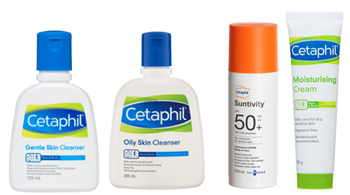Dr Sheridan Why Your Skincare Routine Needs To Be Adapted To Winter Interview

Dr Sheridan Why Your Skincare Routine Needs To Be Adapted To Winter Interview
According to leading dermatologists it is important to change our skincare routine in winter to a multi-purpose cleanser, creamier moisturiser and an SPF as our skin is more prone to dehydration and sensitivity.
'In winter our skin becomes dehydrated and tends to appear dull, blotchy, flaky and irritated. A supportive soap free cleanser, effective moisturiser and some sort of environmental barrier (ideally an SPF 50+ UVA/UVB sunscreen) are essentials in delivering and maintaining skin that not only looks healthy, but also functions in the healthiest way possible through the harsh winter months," said dermatologist Dr. Adam Sheridan.
Falling temperatures, overexposure to indoor heating and lower air humidity can affect our skin, impairing its barrier function and leaving it vulnerable to dehydration and sensitivity. Cetaphil, the skincare brand used by millions of Australians every day, is specifically designed to help protect skin from the elements even in the harshest conditions.
Step 1: Cleanse
Caring for your skin during winter means opting for a cream cleanser to lock in moisture and keep it hydrated rather than a gel cleanser which can be drying.
'A good cleanser will 'reset and rebalance' the skin as it cleans, removing environmental pollutants and microbes to encourage healthy skin cell turn over. It should also maintain the skin's natural pH, replenish lost moisturising factors and avoid undue disruption of the skin barrier through abrasion and stripping," said dermatologist Dr. Adam Sheridan.
Cetaphil cleansers hydrate and cleanse the skin without the need to use water. Cetaphil's -Gentle Skin Cleanser' offers a gentle approach in removing surface oils, dirt and light make-up without clogging pores or stinging eyes. It is pH balanced and lanolin and fragrance free. Cetaphil's -Oily Skin Cleanser' provides effective cleansing for oily, combination or blemished skin by removing oil without affecting the skin barrier. Gentle Skin Cleanser 125ml - RRP $8.60 and Oily Skin Cleanser 235ml - RRP $11.
Step 2: Moisturise and Protect
After cleansing, it is important to apply a daily moisturiser which contains SPF. A common misconception is that cold, overcast days preclude the need for sunscreen application. According to a study conducted by Canstar Blue, 90% of Australians ignore health warnings to apply sunscreen during winter . Although UV levels are lower in winter, UV radiation still causes a threat to acceleration in skin ageing and skin cancer.
'Cloud, fog and haze do not screen out UV rays, with up to 80 per cent of the sun's rays travelling through clouds. Additionally, car windows block UVB rays but not UVA rays which causes significant damages as it still penetrates into the skin, targeting structures such as collagen and elastin and thus increasing the risk of early signs of ageing," said dermatologist Dr. Adam Sheridan.
Cetaphil Suntivity Liposomal Lotion SPF 50+ is a liposomal formulation with photostable UV filters that deliver highly effective UVA and UVB protection. Suitable for sensitive skin, Cetaphil Suntivity Liposomal Lotion is easy to spread, non-greasy and fast absorbing. It is also non-comedogenic, hypo-allergenic and fragrance free. 100mL RRP $20.95.
Step 3: Condition
During winter our skin tends to be drier due to low ambient humidity. Before you sleep, use a heavier moisturising cream to hydrate dry spots, soothe irritation and restore radiance. Switching from a lotion to a cream moisturiser can provide protection against cold, dry air due to its creamier formulation compared to lotions. Cetaphil Moisturising Cream contains emollients and humectants that binds water to the skin and prevent moisture loss. It also contains Sweet Almond Oil, which is rich in Vitamin A, B and E, to provide soothing and nourishing benefits. Cetaphil Moisturising Cream is clinically proven to double the moisture of the skin in just four days compared to untreated controls . Available in 100g – RRP $9.00, 250g – RRP $13.75, 550g – RRP $19.95.
 Cetaphil products are available from pharmacies nationally, Coles, Woolworths and Priceline stores. For stockist inquiries please phone Galderma on 1800 800 765 (Australia) 0800 175 104 (New Zealand). View the Cetaphil range via www.cetaphil.com.au.
Cetaphil products are available from pharmacies nationally, Coles, Woolworths and Priceline stores. For stockist inquiries please phone Galderma on 1800 800 765 (Australia) 0800 175 104 (New Zealand). View the Cetaphil range via www.cetaphil.com.au.
Interview with Dr Adam Sheridan, Dermatologist and Fellow of ACD and AAFPS
Question: Why does our skincare routine need to be adapted to Winter?
Dr Adam Sheridan: Falling temperatures, overexposure to indoor heating and lower air humidity can affect our skin, impairing its barrier function and leaving it vulnerable to dehydration and sensitivity.
Question: What effect does Winter have on our skin?
Dr Adam Sheridan: In winter our skin becomes dehydrated and tends to appear dull, blotchy, flaky and irritated. A supportive soapâ€free cleanser, effective moisturiser and some sort of environmental barrier (ideally an SPF 50+ UVA/UVB sunscreen) are essentials in delivering and maintaining skin that not only looks healthy, but also functions in the healthiest way possible through the harsh winter months.
Question: How do heaters effect our skin?
Dr Adam Sheridan: Overexposure to indoor heating and lower air humidity can affect our skin, impairing its barrier function and leaving it vulnerable to dehydration and sensitivity.
Question: What products should we use if we notice our skin is becoming flakey?
Dr Adam Sheridan: It is important to change our skincare routine in winter to a multi-purpose cleanser, creamier moisturiser and an SPF as our skin is more prone to dehydration and sensitivity.
Question: What is cleansing our face, so important?
Dr Adam Sheridan: A good cleanser will 'reset and rebalance' the skin as it cleans, removing environmental pollutants and microbes to encourage healthy skin cell turn over. It should also maintain the skin's natural pH, replenish lost moisturising factors and avoid undue disruption of the skin barrier through abrasion and stripping.
Question: Should we still wear sunscreen in Winter?
Dr Adam Sheridan: A common misconception is that cold, overcast days preclude the need for sunscreen application. According to a study conducted by Canstar Blue, 90% of Australians ignore health warnings to apply sunscreen during winter.
Although UV levels are lower in winter, UV radiation still causes a threat to acceleration in skin ageing and skin cancer. Cloud, fog and haze do not screen out UV rays, with up to 80 per cent of the sun's rays travelling through clouds. Additionally, car windows block UVB rays but not UVA rays which causes significant damages as it still penetrates into the skin, targeting structures such as collagen and elastin and thus increasing the risk of early signs of ageing.
Visit www.sdsl.com.au for more information.
Interview by Brooke Hunter
MORE



